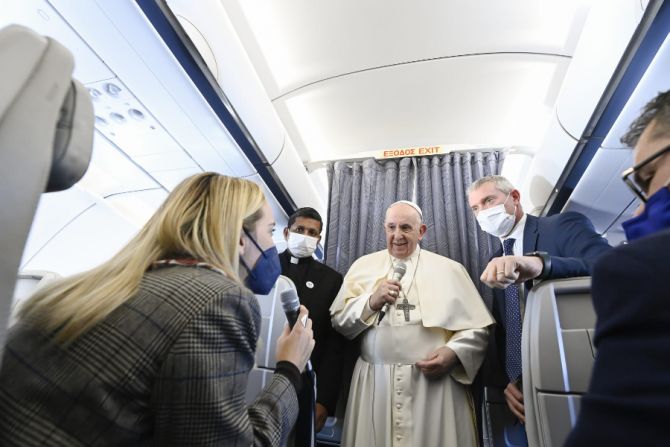Pope Francis: hope for meet with Russian Orthodox leader

Would be 2nd meet after 1,000 year rift ended in 2016
By Hannah Brockhaus, Catholic News Agency
On the return flight from Greece, Pope Francis said that a second meeting with Patriarch Kirill of Moscow, the head of the Russian Orthodox Church, is being organized.
“A meeting with Patriarch Kirill is not far on the horizon. I think next week [Metropolitan] Hilarion is coming to me to arrange a possible meeting,” the pope said during a press conference aboard the papal plane on Dec. 6, the saint’s day of St. Nicholas, on his return from a trip to Greece and Cyprus. Fittingly, St. Nicholas is revered by Orthodox and Roman Catholic churches.
In 2016, Pope Francis and Patriarch Kirill took a major step toward healing a rift between the Russian Orthodox and Roman Catholic churches, meeting for the first time in 1,000 years in Cuba.
Aboard the papal plane Dec. 6, Pope Francis expressed his willingness to travel anywhere, including Moscow, for the meeting, emphasizing that what is more important than “protocols” is that the patriarch is his brother.
The pope’s comments came at the end of a five-day visit to Cyprus and Greece, two Mediterranean countries with predominantly Orthodox populations.
During his trip, the pope spoke about his desire that the Catholic Church and Orthodox Church in Cyprus and Greece would continue to strive for full unity.
“A meeting with Patriarch Kirill is not far on the horizon. I think next week [Metropolitan] Hilarion is coming to me to arrange a possible meeting.”
Pope Francis aboard papal plane on return flight from Greece and cyprus, Dec. 6, 2021
The Russian Orthodox Metropolitan of Volokolamsk said in an interview after an October meeting with Francis that he thought another encounter between the pope and Patriarch Kirill of Moscow would take place. Pope Francis’ historic meeting with Patriarch Kirill in Cuba in 2016 marked the first time a pope met with the head of the Russian Orthodox Church in almost 1,000 years.
According to Metropolitan Hilarion Alfeyev, who serves as the chairman of the Department for External Church Relations of the Moscow Patriarchate, the next meeting is unlikely to occur in Moscow.
Hilarion said that a papal trip to Russia would be “impossible at the moment.”
Pope Francis began his latest international trip on Dec. 2 with a visit to the divided capital city of Nicosia in Cyprus.
In two days, the pope met Cypriot authorities, Orthodox bishops, local Catholics, and migrants, as well as celebrating Mass in the country’s largest stadium.
The pope’s three days in neighboring Greece included meetings with political authorities, Orthodox leaders, the Catholic community, local Jesuits, and migrants on the island of Lesbos. He also celebrated Mass at a concert hall in the capital and met with young people in Athens before his return flight to the Vatican.
Speaking on the plane, Francis said it is not nice to see brothers fighting, noting that though there is division between Catholics and Orthodox Christians, they must journey toward unity.
“I am grateful to Ieronymos, to Chrysostomos, to all the patriarchs who have this desire to walk together in unity,” the pope said, referencing two Orthodox leaders he met on his trip.
In Nicosia, Pope Francis had a private meeting on Dec. 3 with Chrysostomos II, the Orthodox archbishop of Cyprus, followed by an encounter with the Holy Synod of the Orthodox Church of Cyprus.
The Holy Synod is the highest authority of the Church of Cyprus, an autocephalous Eastern Orthodox Church.
Pope Francis also met privately with Ieronymos II, archbishop of Athens and All Greece, on Dec. 4, and with other bishops of the Greek Orthodox Church.
During the meeting, he apologized for the mistakes of Catholics, saying: “Shamefully, patriarch, — I acknowledge this for the Catholic Church — actions and decisions that had little or nothing to do with Jesus and the Gospel, but were instead marked by a thirst for advantage and power, gravely weakened our communion.”
Like Pope St. John Paul II’s visit to Greece in 2001, Francis’ trip was controversial in some corners of the Greek Orthodox Church. One Orthodox cleric protested against Pope Francis, shouting, “Pope, you are a heretic!” at him outside of the patriarch’s residence.
On the papal plane, Pope Francis told journalists that theologians have to continue to study points of unity and division between the Catholic Church and Orthodox Churches. Meanwhile, others should “go forward together,” praying for Christian unity.
“The great Orthodox theologian [John] Zizioulas once jokingly said that ‘unity will be found in the Eschaton [the end of the world].’” Francis noted. “It’s a saying, but it doesn’t mean we have to stand still…”

